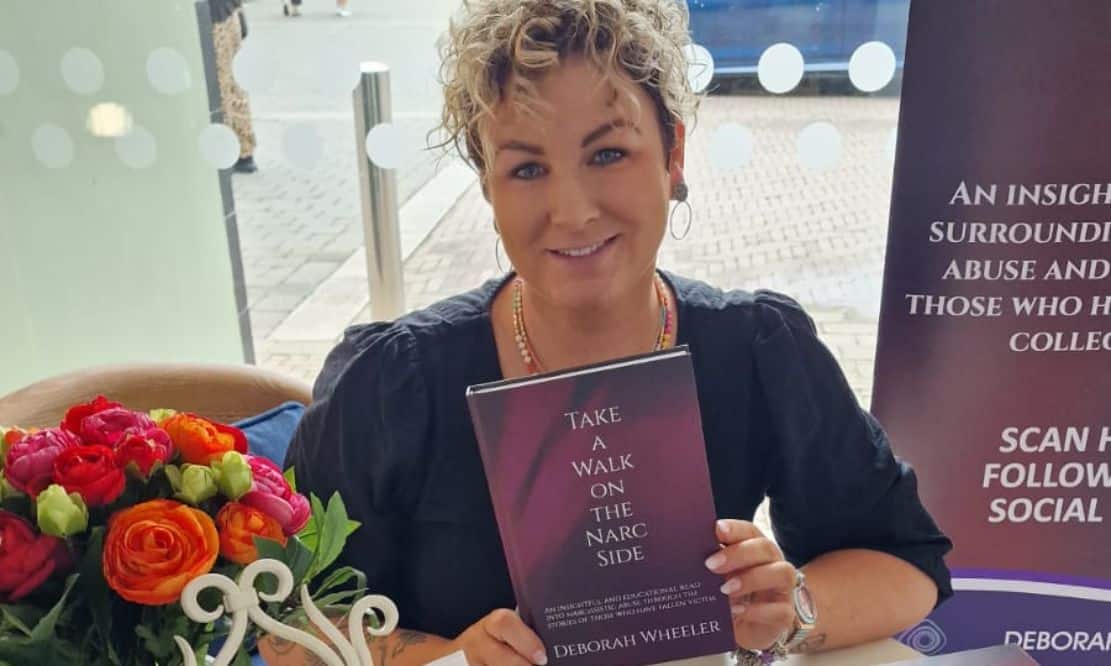
The word “narcissist” is often carelessly bandied about, all too readily pinned to those with an over-inflated ego or grandiose sense of entitlement.
In contemporary times the word has become a label of the arrogant or those we simply do not like.
But one Eglish author who has lived experience in a narcissistic relationship has warned of the term’s misappropriation, saying that using it flippantly without full understanding “undermines the victims who are abused by these people”.
Author of ‘Take a Walk on the Narc Side‘, Deborah Wheeler spoke to Armagh I about her own personal experience and how this spurred her to become the sounding board for others navigating narcissistic relationships by becoming a specially trained and fully accredited life coach and Narcissistic Abuse Specialist, offering services through her newly founded company, Re.Vive.Coaching.
Deborah suffered years of abuse during a previous relationship which ultimately saw her repeatedly gaslighted, on the receiving end of infidelity, financial control – which she said worsened following their separation – and even stalking and surveillance of her home.
The fear of the narcissist’s unpredictably, she says, is part of the reason that more people do not seek help.
Said Deborah: “This is the reason why victims of narcissistic abuse find it very difficult to seek the help because they are so confused as to what is going on.
“They have been gaslighted, their self-esteem has been taken away from them, they have been isolated from friends and family.
“They don’t even know how to articulate that out to somebody to seek that help and that’s why it’s a lonely, lonely form of abuse.
“It’s a long term thing. Narcissistic abuse is never going to happen in the first six months of your relationship. You’ll see red flags but it’s an insidious form of abuse that happens over a period of time and it’s always mixed with good and that’s what gives the victims hope.”
In speaking of her own experience, Deborah focussed largely on the post-separation element which she said doesn’t get enough attention.
“Post-separation abuse is something that most people don’t think about. They think leaving a relationship is the hardest thing but actually it can intensify.
“When you have left and made that decision, everything ramps up and it’s very constant. So post-separation abuse is often where people falter and go back.”
During separation from a narcissist, the life coach explained that the “emotional pulls” that a person exhibited at the beginning of the relationship may return in a barrage of ‘love-bombing’ or over-the-top and insincere romantic gestures, or, the abuse could take the opposite form and become “very controlling, very demeaning, very threatening” manifesting itself as stalking, smear campaigns on social media and various other nefarious means.
In her own situation, Deborah explained that the financial control she had experienced prior to separation most definitely increased once she had left. But she also experienced a new and more sinister form of control when a new, ‘unregulated’ third party was brought into play.
“I had a private investigator follow me,” she explained. “He was put under surveillance of my home and photographs were taken but the thing to be really aware of is that private investigators aren’t regulated. Anyone can be a private investigator.
“When the police get involved it’s a very grey area because it’s public, if they are out following you there’s not a lot you can do.
“The company that was used to track me, advertise that they put trackers on cars on their website but the police told me if they came onto the property to put a tracker on my car I could do something for trespassing but I would have to prove that they did that.
“If they followed me to the supermarket while I was doing my shopping and they put the tracker on my car then there was absolutely nothing I could do.”
This caused Deborah to take stock of the legal system in Northern Ireland – which is one that she feels still has ample room for improvement – when it comes to protecting victims of domestic abuse. Abuse is not confined to acts of physical violence, she says, and extends to all those living with coercive control and psychological and emotional manipulation.
Deborah said: “The laws are very lax. Now we have stalking laws in Northern Ireland and coercive control laws and again that is very new and it has to filter all through all the different professions.
“The social workers have to be versed on this, police have to be versed on this, the courts too, and then you might get a policeman or social worker who is more ‘old school’ and isn’t up to date with modern society and doesn’t see this as a form of abuse because it’s psychological rather than physical.
“We are dealing with these people. This is who we turn to when we need support for our kids or need to go through the legal systems. It’s a long road trying to get support for victims.”
When asked if she felt that awareness of narcissistic abuse was improving, Deborah hesitated. The term is used readily in today’s society – which is new, she says – but not necessarily for the good.
“When I was in that relationship, I didn’t know I was in a narcissistic relationship, ” said Deborah. “Someone said to me, ‘He sounds like a narcissist’. I looked up the term and started listing all the personality traits and it was a lightbulb moment.
“It wasn’t just plain sailing from there. I had to learn the importance of the ‘no contact rule’ because at that stage I was still engaging. It’s hard to break habits.
“I think there is a danger people are using the word incorrectly. I think, with many things in society, people jump on it. Like if a boy cheats on a girl, people will jump on it and say he’s a narcissist or he’s so full of himself, he’s a narcissist.
“You should never, ever say that. That person is not necessarily a narcissist. That person may have high levels of narcissistic traits or they may act in some way that you could say their behaviour was narcissistic, but to say they are a narcissist; it undermines the victims who are abused by these people.
“I think that although the word is being used a lot more, there is awareness but I think there’s a real danger that people are using it in the wrong context.”
Finding a narcissist with a diagnosis of narcissistic personality disorder (NPD) is “like finding a needle in a haystack”, says Deborah. Understandably, as part of their condition, it’s unlikely they will ever see the true reflection of their own behaviours in a way that would prompt them to seek help.
“They are wired differently from us,” she said. “If you think that they are the same as you, you’re going to show your empathetic side, your understanding and compassion and want to support them in whatever they are doing. I’m not saying that in any derogatory way, but your understanding and your empathy needs to be directed proportionately compared to anyone else.”
And while, statistics typically denote that most narcissists are men, she says, this should be viewed with caution.
Explained Deborah: “I question the stats. Is that true or is it a case that the men who are victims of this abuse just don’t come forward?
“There’s no way they are going to tell their mates that their wife or girlfriend takes their money or takes the car keys or hits them when she gets frustrated because there is this sense of pride and male ego. I do know the statistics will say it’s mainly men but I just think they are inaccurate.
“Most of the books that are written about narcissistic journeys are usually by women. It’s women taking that forward step to help other people but men just want to put it to bed. They say, ‘That happened to me, I don’t want to talk about it again and I’m certainly not writing a book to tell the whole world about it’.”
Nonetheless, the life coach frequently sees men coming forward for support. Their stories are similar but their experiences can often be quite different.
She said: “A man’s main tactic is often to control finances or support for the family when you leave but women tend to have a go-to tactic of using the children from that relationship, where they can manipulate or poison against the other parent and a victim could again end up in that JADE theory.”
As a Narcissistic Abuse Specialist, Deborah’s lived experience helps her provide individuals with tips and support in a way that should minimise or reduce the narcissist’s control. As she says, “You have to live it to know it.”
Part of her process involves helping people identify their application of the JADE theory; an anagram for justify, answer, defend and explain. If you find yourself repeatedly performing these defence mechanisms, you may be dealing with a narcissist and recognising this is a step towards breaking that cycle, she says.
She founded Re.Vive.Coaching in January 2024 to be “the support network that I didn’t have and knew I was lacking”.
Now she shares a wealth of knowledge gained though experience from employing the ‘no contact rule’, advice about court conduct, how to prepare financially to become independent of a toxic partner and how to spot and react to red flags.
Stressing the importance of accountability, she explained: “The first red flag that comes up listen to your gut. No matter what that red flag is, whatever it may be, if it makes you feel uneasy – the first one we bank but we never forget it.
“Then we just watch but don’t watch for too long. If you keep ignoring the red flags it could be six years down the line and it’s so much harder to get out. It’s about realising those red flags are there and once you see a pattern of repeated behaviour that’s what you want.
“Anyone can make mistakes but actions speak louder than words. If you get an apology and it’s sincere you will see change. If you get an apology and it’s not genuine, that same mistake will happen again and it’s at that point you have to stop yourself and take accountability for your choices.
“Take off the rose tinted glasses and look at this in black and white. You have to be smarter than that and stop letting your heart rule your head.”





